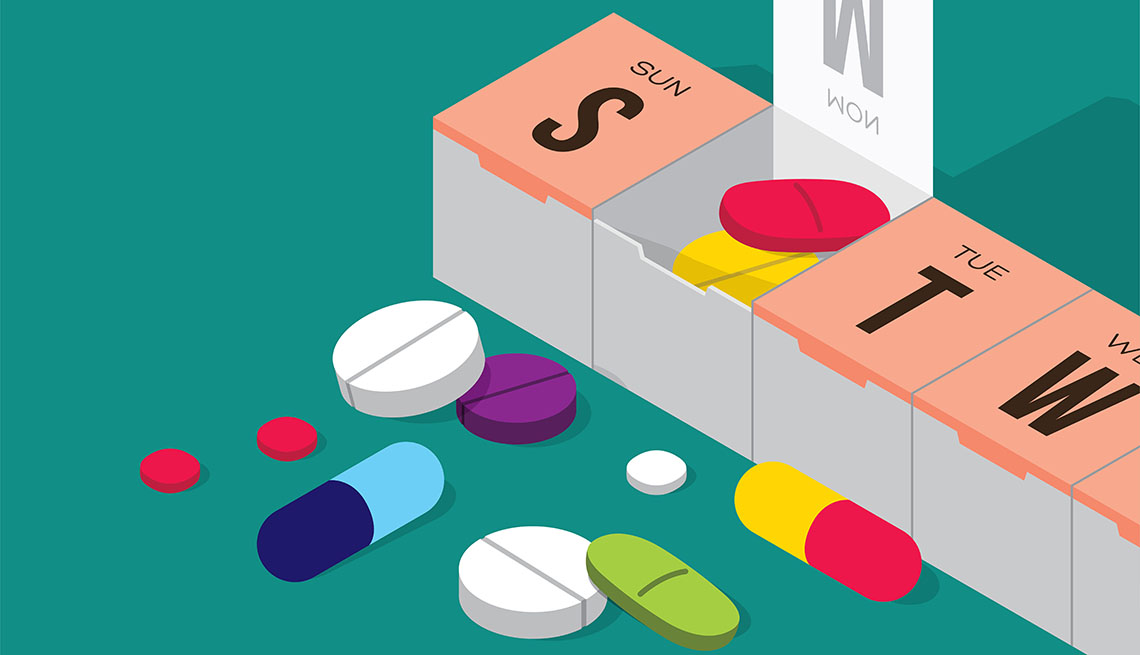AARP Hearing Center
In March 2021, Mary Ann Johnson of Warwick, Rhode Island, reached down to pick something up off the floor and suddenly felt dizzy. She tried to get to the couch but tripped on a chair and fell, and the chair toppled on top of her. Johnson ended up with a knee fracture and a deep gash on her forehead.
It wasn’t the first time Johnson had fallen in recent months, and she also constantly felt tired and weak. Fortunately, Johnson’s doctor recognized that dizziness and fatigue can sometimes be a medication side effect, so he asked a clinical pharmacist to review Johnson’s prescriptions. Johnson, 70, was taking more than 16 medications, including several that affect the central nervous system (the brain and spinal cord).
Pharmacist Brianna Kimball recommended that Johnson reduce the dose of one of her prescriptions and stop taking three others altogether. It made a difference.
“I’m doing fine without them,” Johnson says, “and I haven’t had the lightheadedness.”
More pills than ever
Experts have warned for years about the dangers of taking five or more drugs at the same time — a phenomenon known as polypharmacy. Yet over the past two decades, the percentage of people age 65 and older taking five or more prescriptions has tripled, from 14 to 42 percent, according to data from the Centers for Disease Control and Prevention (CDC). Nearly 20 percent of older adults take 10 drugs or more, according to the Lown Institute.
Use of over-the-counter drugs and dietary supplements is also at an all-time high, Council for Responsible Nutrition data shows.
While medicines are critical for keeping us healthy, they all have side effects. And the more medications you take, the higher your risk of experiencing a problem or a dangerous interaction, says Sabine von Preyss-Friedman, M.D., a geriatric specialist and chief medical officer for Avalon Health Care Group, whose services include assisted living and home health care.
Tips to avoid prescription overload
- Try nondrug alternatives. Before taking any new drug, consider whether there’s a way to try to treat the problem first without medication. Can you change your diet to control your diabetes or high blood pressure? Eliminate caffeine to help your insomnia?
- Read the medication guide or insert. Pay special attention to harmful interactions and side effects, keeping in mind that they may not affect you right away.
- Keep an up-to-date list of your medications. Make sure it includes over-the-counter drugs and supplements, which can cause dangerous reactions when mixed with certain prescriptions.
- Stick to one pharmacy. Discounts may tempt you to transfer your medications to different pharmacies, but if you fill all of your prescriptions in one place, it’s easier for your pharmacist to spot possible interactions and safety issues.
- Schedule a medication review. Sit down with your primary care doctor or pharmacist and talk about each of your medications and supplements — ask why you’re taking it, if there are safer ways to manage your symptom, and if it’s worth trying to go without.
Every day, 750 adults age 65 or older are hospitalized for serious side effects from a medication, according to the Lown Institute. One Lown Institute study found that you are 88 percent more likely to seek care for a drug complication or side effect if you take five or more medications. Other research shows that your fall risk increases 7 percent for each medication you take.
“It’s to the point that taking too many medications becomes an illness in and of itself,” von Preyss-Friedman says.
Older adults at greater risk
Older adults accumulate medications for a variety of reasons. It’s partly because they are living longer and are more likely to have chronic diseases that require medical management. But it’s also because when patients report a symptom, doctors have a tendency to prescribe a new medication first, rather than recommend a lifestyle change or consider whether the symptom could be caused by a different drug.
“It is always easier to just add another medication rather than take one away,” von Preyss-Friedman says.
Adults who see a few different doctors to manage their chronic conditions run the risk of having each specialist prescribe a different medication without taking into account the overall effect on the patient, says Hedva Barenholtz Levy, president of the American Society of Consultant Pharmacists and an independent pharmacist in St. Louis.



































































